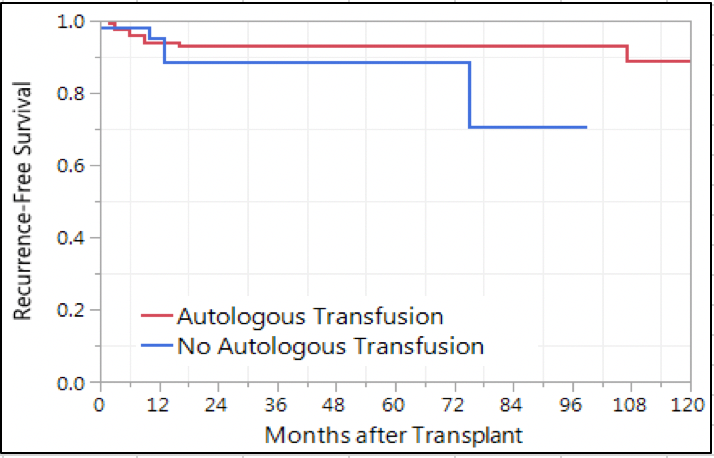Long Term Impact of Intraoperative Autologous Blood Transfusion on HCC Recurrence in Liver Transplantation
1Division of Abdominal Transplant, OHSU, Portland, OR, 2Department of General Surgery, OHSU, Portland, OR
Meeting: 2019 American Transplant Congress
Abstract number: D119
Keywords: Blood transfusion, Cadaveric organs, Hepatocellular carcinoma, Liver transplantation
Session Information
Session Name: Poster Session D: Liver: Hepatocellular Carcinoma and Other Malignancies
Session Type: Poster Session
Date: Tuesday, June 4, 2019
Session Time: 6:00pm-7:00pm
 Presentation Time: 6:00pm-7:00pm
Presentation Time: 6:00pm-7:00pm
Location: Hall C & D
*Purpose: The aim of this study was to determine whether intraoperative autologous transfusion in liver transplant patients with HCC affects the rate of recurrence.
*Methods: We identified 187 patients who underwent liver transplantation for HCC at our institution between 2008-2018. Patients were excluded if younger than 18 years, or had unexpected extrahepatic disease including nodal metastases at the time of transplant. Patients were divided into groups based on use of autologous transfusion (AT) or not (nAT) at the time of liver transplant. Demographic and tumor characteristics were compared between groups. HCC recurrence was determined by surveillance imaging. Cumulative incidence over 10 years was calculated between those who received autologous transfusion and those who did not. Kaplan Meier analysis was used to assess overall survival between autologous transfusion groups.
*Results: Of the 187 patients meeting inclusion criteria, 131 received intraoperative autologous transfusion. The AT group had a higher biologic MELD at transplant, were younger, and received more blood products overall at transplant. There was no difference in tumor characteristics between groups (Table). The recurrence rate was 10/131 (7.6%) in the autologous group and 5/56 (8.9%) in the nAT group. Recurrence-free survival was not significantly associated with autologous transfusion (p=0.26).
*Conclusions: Neither recurrence free survival nor the cumulative incidence of HCC recurrence were impacted by autologous transfusion. Intraoperative blood salvage is a safe method of resuscitation during liver transplant for HCC.
| Patient risck factor | Autologous Transfusion
N=131
|
No autologous transfusion
N=56
|
p-value |
| Age at transplant | 58.3 (5.8) | 61.1 (4.8) | <.001 |
| MELD biologic | 15.8 (8.2) | 11.5
(5.7)
|
<.002 |
| Autologous blood (mean, liters) | 11.3(11.0) | – | – |
| RBCs
(mean, units)
|
6.5 (7.3) | 1.8 (3.0) | <.001 |
| Tumor size (cm) | 2.3 (1.2) | 2.4 (1.2) | .26 |
| # tumors | 1.6 (1.0) | 1.6 (1.1) | .99 |
| AFP | 40.4 (96.7) | 35 (67.2) | .72 |
To cite this abstract in AMA style:
Kelly G, Pasko JL, Dewey E, Maynard E, Orloff SL, Enestvedt C. Long Term Impact of Intraoperative Autologous Blood Transfusion on HCC Recurrence in Liver Transplantation [abstract]. Am J Transplant. 2019; 19 (suppl 3). https://atcmeetingabstracts.com/abstract/long-term-impact-of-intraoperative-autologous-blood-transfusion-on-hcc-recurrence-in-liver-transplantation/. Accessed February 19, 2026.« Back to 2019 American Transplant Congress

